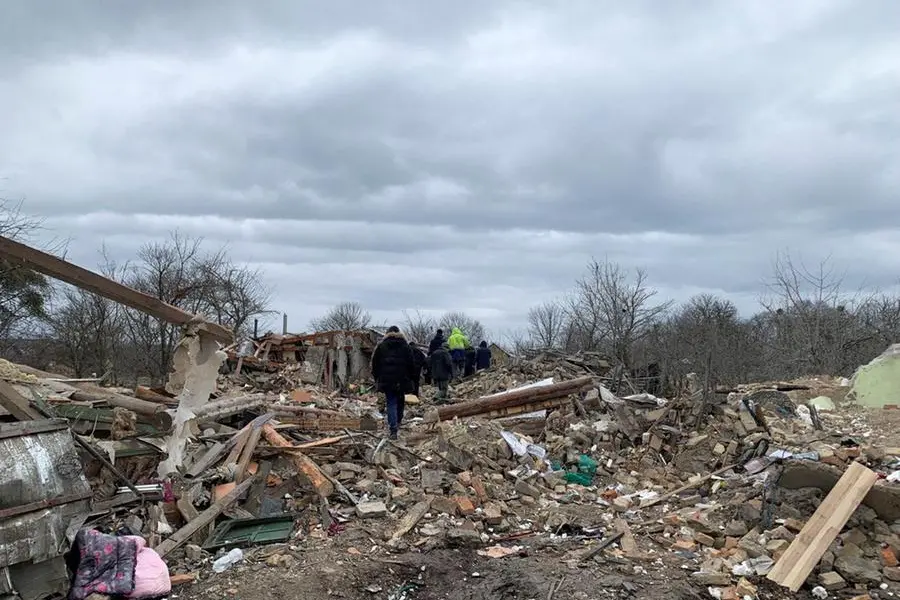PHOTO
Russia launched a huge wave of missile strikes across Ukraine while people slept on Thursday, killing at least six civilians, knocking out electricity and forcing a nuclear power plant off the grid.
The first big volley of missile strikes since mid-February shattered the longest period of comparative calm since Moscow began a campaign to attack Ukraine's civil infrastructure five months ago. President Volodymyr Zelenskiy said infrastructure and residential buildings in 10 regions had been hit.
"The occupiers can only terrorise civilians. That's all they can do. But it won’t help them. They won’t avoid responsibility for everything they have done," Zelenskiy said in a statement.
At least five people were killed in a missile that destroyed a village house in the western Lviv region, according to emergency services. Drone footage from the area, some 700 km (440 miles) from any military battlefield, showed a flattened home surrounded by badly damaged buildings.
Another civilian was reported killed by the missiles in the central Dnipro region. Three civilians were separately reported killed by artillery in Kherson.
In the capital Kyiv, residents were awakened by explosions. A seven-hour air strike alert through the night was the longest of the Russian air campaign that began in October.
"I heard a very loud explosion, very loud. We quickly jumped out of bed and saw one car on fire. Then the other cars caught on fire as well. The glass shattered on the balconies and windows," said Liudmyla, 58, holding a toddler in her arms.
"It's very frightening. Very frightening. The child got scared and jumped out of bed," she said. "How can they do this? How is this possible? They are not humans, I don't know what to call them. They are frightening the children, their mental state will be disrupted."
Moscow says its campaign of targeting Ukraine's infrastructure far from the front is intended to reduce its ability to fight. Kyiv says the air strikes have no military purpose and aim to harm and intimidate civilians, a war crime.
Ukrainian officials said Moscow had fired six of its kinzhal hypersonic missiles, an unprecedented number, which Ukraine has no way of shooting down. Russia is believed to have only a few dozen of the missiles, which President Vladimir Putin regularly touts in speeches as a weapon for which NATO has no answer.
Ukraine said the missiles had knocked out the power supply to the Zaporizhzhia nuclear power plant, Europe's largest, severing it from the Ukrainian grid.
The plant, which Russia has held since capturing it early in the war, is near the front line and both sides have warned in the past of a potential for disaster there caused by fighting. Moscow said the was being kept safe on diesel backup power.
"Everything is absolutely normal: the specialists at the plant are working quite professionally, the automation has started up," Renat Karchaa, an adviser to the CEO of Russian state energy firm Rosenergoatom, said on state TV channel Rossiya 24.
"There is no threat or danger of a nuclear incident. There is more than enough fuel and, if necessary, it will be supplied to the plant."
Kyiv, the Black Sea port of Odesa and the second-largest city Kharkiv were all hit as missiles targeted a wide arc of targets, stretching from Zhytomyr, Vynnytsia and Rivne in the west to Dnipro and Poltava in central Ukraine, officials said.
"Unfortunately, a missile of the Kinzhal type hit an infrastructure object," said Serhiy Popko, the head of Kyiv region's military administration.
Kyiv mayor Vitali Klitschko reported explosions in the southwestern part of the capital. He said on Telegram that 40% of consumers in Kyiv were without heating due to electricity shutdowns.
The governor of Odesa region, Maksym Marchenko, said on Telegram that a mass missile attack had hit an energy facility in the city, cutting power. Residential areas had also been hit.
Kharkiv region Governor Oleh Synehubov said the city and region had been hit by 15 strikes, with targets including infrastructure.
UKRAINE FIGHTS ON AT BAKHMUT
On the battlefield, the week has seen an apparent shift as Ukraine has decided to stay and fight in Bakhmut, a small city that has borne the brunt of a Russian winter offensive in the bloodiest fighting of the war.
Moscow says it is strategically important as a step to securing the surrounding Donbas region, a major war aim. The West says the ruined city has little value and Russian generals are sacrificing lives to give Putin his only victory since sending hundreds of thousands of reservists into battle at the end of last year.
Ukraine had appeared likely to withdraw from Bakhmut, but has now signalled a new determination to fight on, with commanders saying they are inflicting enough damage on Russia's assault force to make a continued fight worthwhile.
"The importance of keeping Bakhmut is constantly growing," General Oleksandr Sirskiy, commander of Ukraine's ground forces, said in remarks released by the military on Thursday.
"Each day of the defense of the town allows us to gain time to prepare reserves and prepare for future offensive operations," he said. "The enemy loses the most prepared and combat-capable part of his army."
Yevgeny Prigozhin, head of Russia's Wagner private army which has led the fighting in Bakhmut, said on Wednesday his forces controlled all of the city east of the Bakhmut river that runs through it.
Around two-thirds of the city are on the west bank. Russian forces have been advancing north and south of the city, to cut off the Ukrainian garrison but have not yet succeeded in closing the circle.
Moscow, which claims to have annexed a fifth of Ukraine, says it launched its "special military operation" a year ago to combat a security threat from its neighbour's ties to the West. Kyiv and the West call it an unprovoked war of aggression to subdue and conquer an independent state. (Reporting by Reuters bureaux, Writing by Peter Graff, Editing by Angus MacSwan)





















